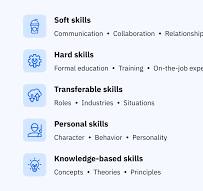Exploring Different Types of Skills
In today’s fast-paced and competitive world, having a diverse set of skills is crucial for personal and professional growth. Skills can be broadly categorized into different types, each playing a unique role in shaping an individual’s capabilities and success.
Hard Skills
Hard skills are specific, teachable abilities that can be quantified and measured. These skills are usually acquired through education, training, or experience in a particular field. Examples of hard skills include coding, data analysis, accounting, and foreign language proficiency.
Soft Skills
Soft skills, also known as interpersonal or people skills, are non-technical skills that relate to how you work with others. These skills are often more difficult to quantify but are equally important for success in various roles. Examples of soft skills include communication, teamwork, problem-solving, and leadership.
Transferable Skills
Transferable skills are versatile abilities that can be applied across different roles and industries. These skills are not specific to a particular job but can be valuable in various contexts. Examples of transferable skills include time management, adaptability, creativity, and critical thinking.
Job-Specific Skills
Job-specific skills are those that are directly related to a particular job or industry. These skills are essential for performing specific tasks or functions within a given role. Examples of job-specific skills include medical knowledge for healthcare professionals, legal expertise for lawyers, and engineering proficiency for engineers.
By understanding the different types of skills and their significance, individuals can identify areas for improvement and development to enhance their overall skill set. Combining a mix of hard, soft, transferable, and job-specific skills can lead to greater opportunities for personal growth and career advancement.
Mastering Essential Skills: Key Areas for Personal and Professional Growth
- Communication Skills
- Problem-Solving Skills
- Teamwork Skills
- Time Management Skills
- Adaptability Skills
- Leadership Skills
Communication Skills
Effective communication skills are essential in both personal and professional settings. The ability to convey information clearly, listen actively, and engage with others plays a crucial role in building strong relationships and achieving common goals. Communication skills encompass verbal and non-verbal communication, as well as the capacity to express ideas cohesively and empathetically. By honing communication skills, individuals can enhance their influence, resolve conflicts constructively, and foster a positive environment conducive to collaboration and understanding.
Problem-Solving Skills
Problem-solving skills are a valuable asset in both personal and professional settings. Individuals with strong problem-solving abilities can effectively analyse complex situations, identify root causes of issues, and develop innovative solutions to overcome challenges. These skills involve critical thinking, creativity, and the ability to think analytically to find effective resolutions. By honing problem-solving skills, individuals can navigate obstacles with confidence and contribute positively to achieving goals and objectives in various aspects of their lives.
Teamwork Skills
Teamwork skills are essential in today’s collaborative work environments. Being able to effectively communicate, cooperate, and coordinate with others is crucial for achieving common goals and fostering a positive team dynamic. Strong teamwork skills involve active listening, offering support to team members, and being open to different perspectives and ideas. By honing their teamwork skills, individuals can contribute meaningfully to group projects, build strong relationships with colleagues, and create a supportive work environment that encourages success for all team members.
Time Management Skills
Effective time management skills are essential for individuals to maximise productivity and achieve their goals efficiently. By mastering time management, individuals can prioritise tasks, set realistic deadlines, and allocate their time wisely to ensure that important responsibilities are completed in a timely manner. Time management skills also help in reducing stress levels and improving work-life balance by allowing individuals to make the most of their available time. Whether it’s meeting project deadlines or balancing personal commitments, honing time management skills can lead to increased efficiency and overall success in various aspects of life.
Adaptability Skills
Adaptability skills are essential in today’s rapidly changing work environment. Individuals with strong adaptability skills can easily adjust to new situations, challenges, and environments. They demonstrate flexibility, resilience, and a willingness to learn and evolve as circumstances evolve. Employers value adaptability skills as they enable employees to navigate uncertainties and embrace change with a positive attitude. Developing adaptability skills not only enhances one’s professional capabilities but also fosters personal growth and readiness for whatever the future may hold.
Leadership Skills
Leadership skills are essential attributes that enable individuals to guide, inspire, and motivate others towards a common goal. Effective leaders exhibit qualities such as communication, decision-making, problem-solving, and emotional intelligence. By developing strong leadership skills, individuals can not only drive positive change within teams and organisations but also foster collaboration and innovation. Leadership skills are valuable in various aspects of life, from leading a team at work to taking on responsibilities in community initiatives.

